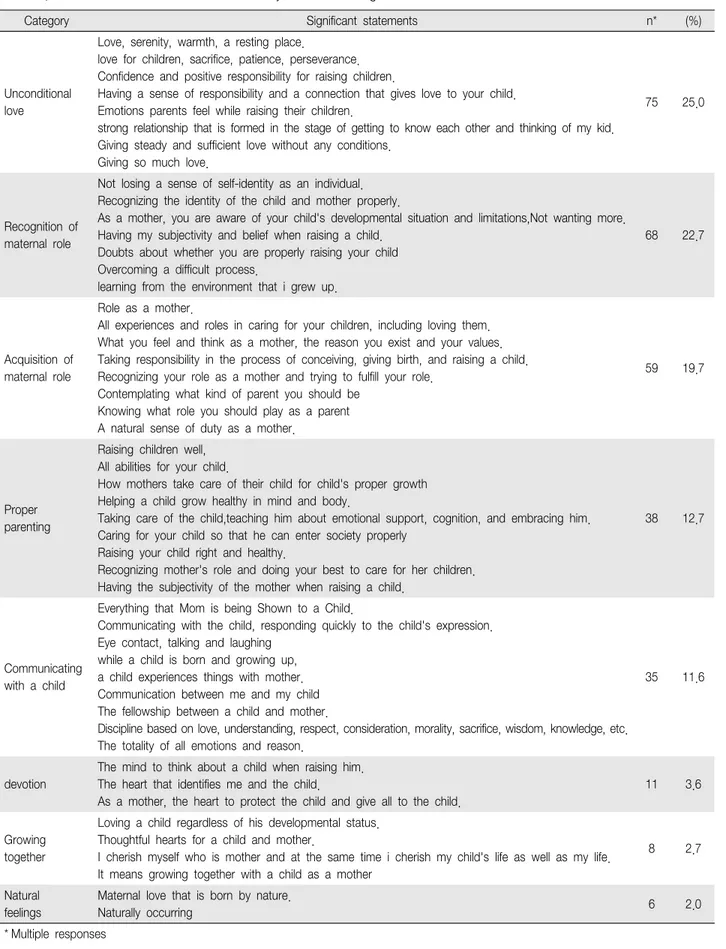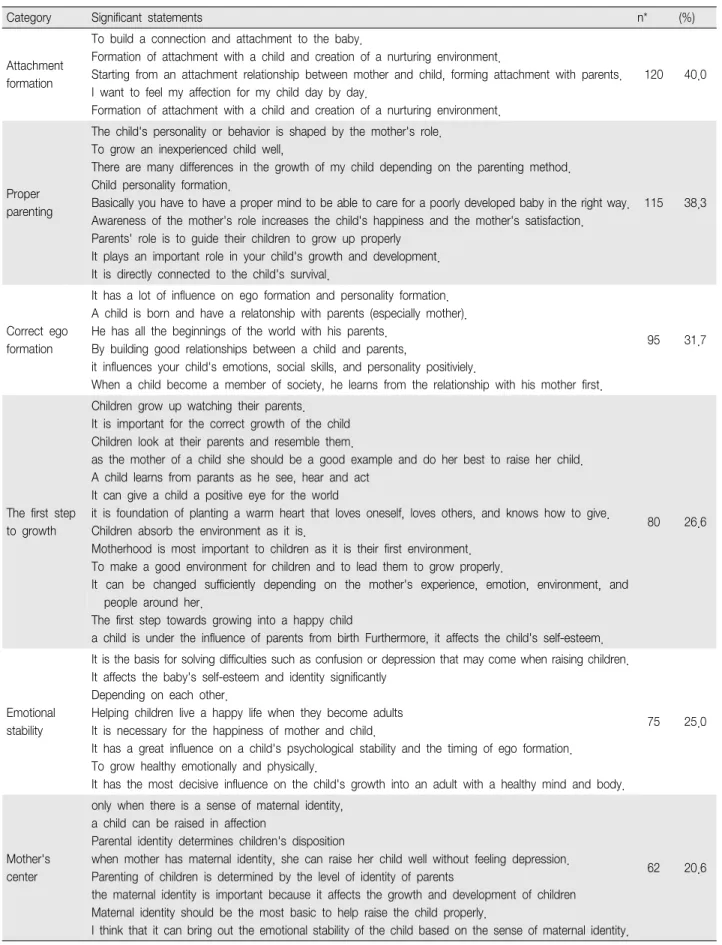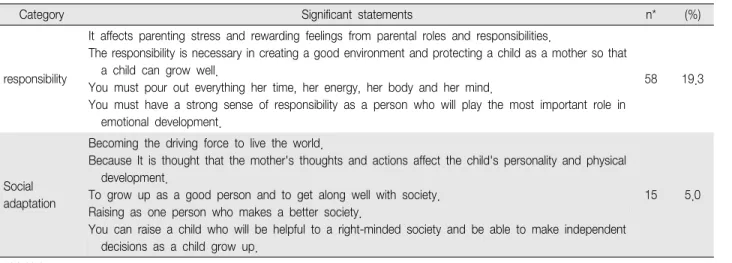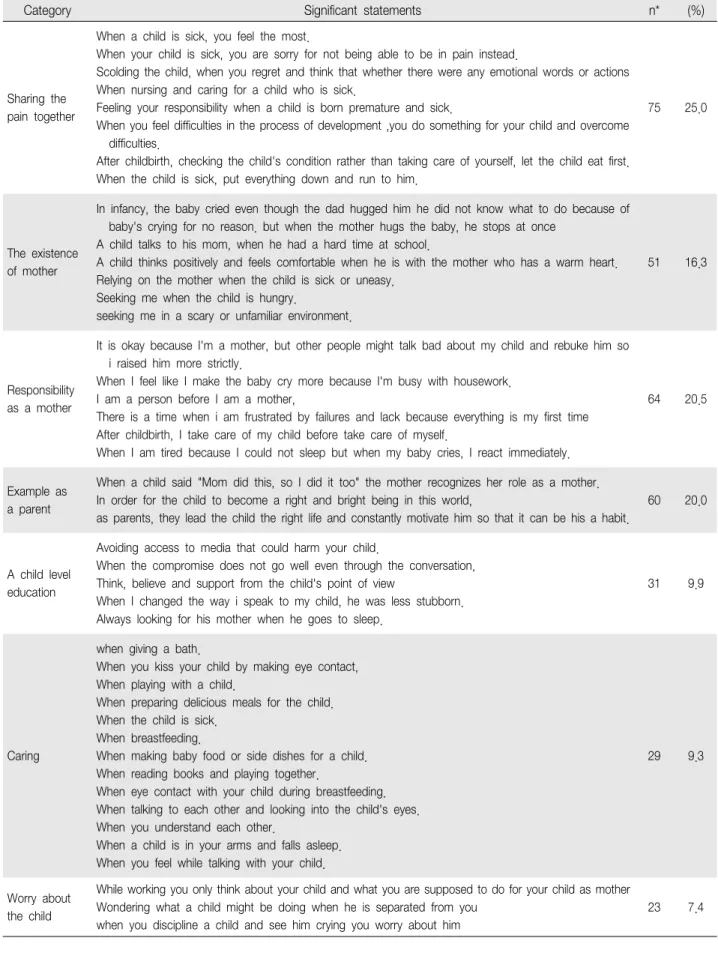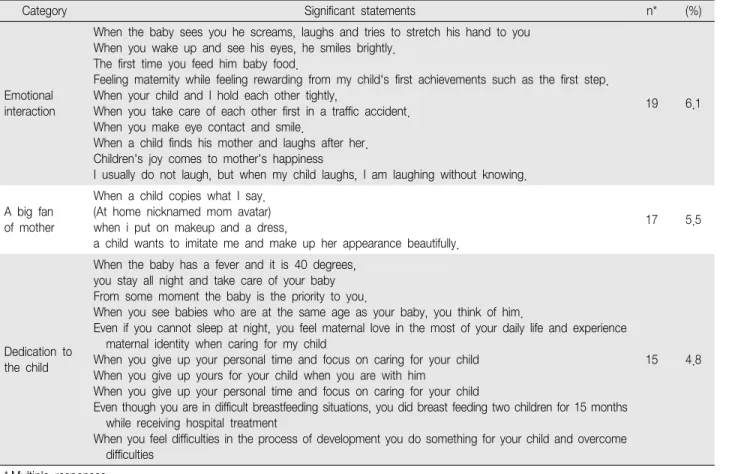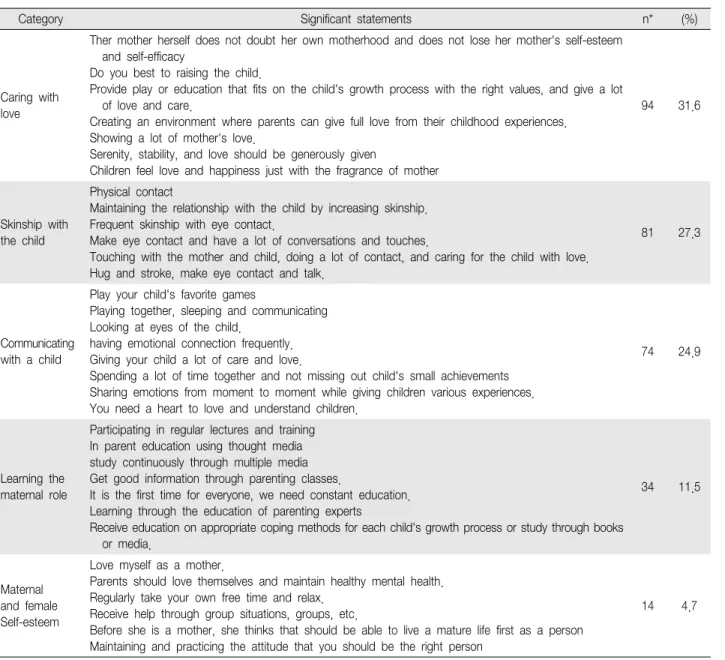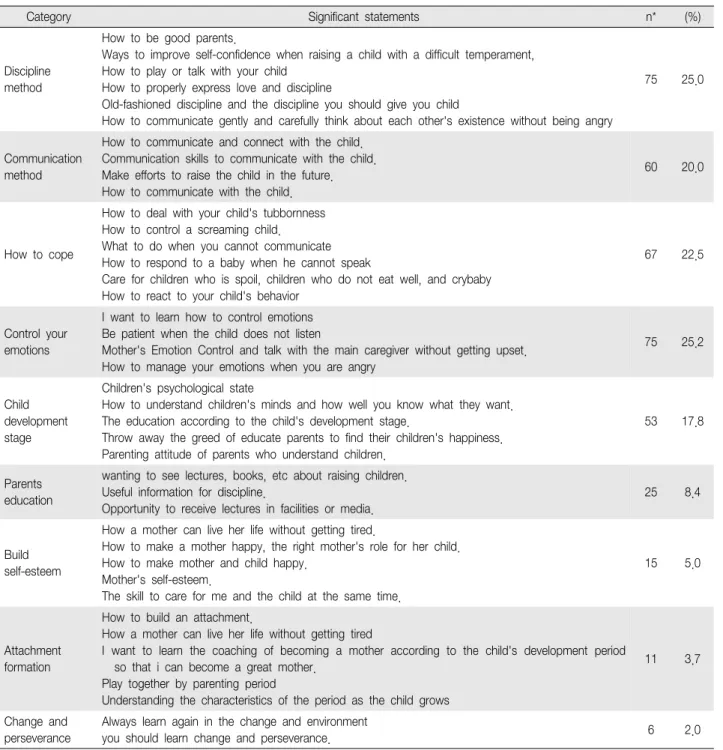한국간호연구학회지 별책 제5권 제1호 2021년 3월 The Journal of Korean Nursing Research
Vol. 5, No. 1, March. 2021
-내용분석기법으로
신혜선1 ․ 박상용2 ․ 박선정3 ․ 고가연4 ․ 박복순5
1여주대학교, 조교수 ․ 2동아보건대학교, 조교수 ․ 3삼육보건대학교, 조교수
4강릉영동대학교, 부교수 ․ 5송호대학교, 조교수
Maternal identity perceived by mothers with infancy children
- Focused on the Application of Content Analysis Technique
Hye sun, Shin1 ․ Sang Young, Park2 ․ Sun Jung, Park3 Ga Yeon, Ko4 ․ Bock Soon, Park5
1Department of Nursing, Yeoju Insstitute of Technology, Assistant Professor
2Department of Clinical Laboratory, Donga College of Health, Assistant Professor
3Department of Nursing, Shamyook Health University, Assistant Professor
4Department of Nursing, Gangneung Yeongdong University, Associate Professor
5Department of Nursing, Songho University, Assistant Professor
교신저자 : Bock Soon, Park / (25242) 210, Namsan-ro, Hoengseong-eup, Hoengseong-gun, Gangwon-do, Republic of Korea Tel : +82-33-340-1194, +82-10-3070-3805, Fax : +82-33-340-1068, E-mail : cjc3532@naver.com
접수일 : 2021.02.25 / 수정일 : 2020.03.03 / 게재확정일 : 2021.03.31
유아기 어머니가 인식하는 모성정체성
-내용분석기법으로
신혜선1 ․ 박상용2 ․ 박선정3 ․ 고가연4 ․ 박복순5
1여주대학교, 조교수 ․ 2동아보건대학교, 조교수 ․ 3삼육보건대학교, 조교수
4강릉영동대학교, 부교수 ․ 5송호대학교, 조교수
Maternal identity perceived by mothers with infancy children
- Focused on the Application of Content Analysis Technique
Hye sun, Shin1 ․ Sang Young, Park2 ․ Sun Jung, Park3 Ga Yeon, Ko4 ․ Bock Soon, Park5
1Department of Nursing, Yeoju Insstitute of Technology, Assistant Professor
2Department of Clinical Laboratory, Donga College of Health, Assistant Professor
3Department of Nursing, Shamyook Health University, Assistant Professor
4Department of Nursing, Gangneung Yeongdong University, Associate Professor
5Department of Nursing, Songho University, Assistant Professor
Abstract
Purpose : This study analyzes the perception of maternal identity of mothers who have infancy children.
Methods: This study was conducted using Content Analysis with sample of 65 mothers with infant children from October 2019 to January 2020. The 65 mothers were interviewed and the outcomes of the interview and their parenting statements were analyzed with content analysis. Statements were categorized and analyzed according to the selected procedure. Results : The results of the study are as follows: the 47 statements in total on perception of the meaning of maternal identity were identified into 8 categories and the total 54 statements on the im- portance of maternal identity were classified into 8 categories. On the other hand, the total 61 statements as for the experience of maternal identity while raising children are grouped into 10 categories and the 33 statements in total as for the ability to demonstrate maternal identity while raising children were analyzed to have 5 categories. Finally, the total 37 statements on the intention to learn about establishing maternal identity while raising children were categorized in 9 groups. Conclusion : In conclusion: the outcomes of this study cite that it is necessary for the relevant organization to develop and apply a proper maternal identity promotion program so that they could help mothers with infant children establish their maternal identity.
Key words : Infancy children, Mothers, Perception
Ⅰ. 서 론
1. 연구의 필요성
최근 우리사회의 저 출산은 심각한 사회적 문제로 대두되고 있다. 저 출산의 의미는 한 사회가 일정시 점의 인구 구조를 지속하기 위해 필요한 인구 대체 출산율(replacement total fertility rate)이 2.1명 이하인 상태를 의미하는데, 현재 우리나라의 출산율은 이보 다 훨씬 낮은 1.3명에도 미치지 못하는 초저출산 사 회이다[1].
여성들은 본인 스스로의 자아를 찾으려는 노력이 증가되고 있고, 자녀를 출산함과 동시에 좋은 어머니 가 되려고 노력하고 있다. 어머니가 된다는 것은 새로 운 정체성을 취한다는 것을 의미하며, 어머니로서 정 체성은 완전히 자신을 다시 생각하고 재정립을 하는 것이다. 또한, 모성정체성은 아기의 어머니로서 이상 적인 이미지를 갖추기 위해 새롭고 바람직한 태도, 능 력, 그리고 이상적인 요소들을 찾기 위해 환경과 기억 을 탐색하고 모방을 거쳐 자신의 모습으로 통합하는 것이다. 이러한 긍정적인 모성정체성이 확립되면 새 로운 역할과 관계형성을 잘 해 나갈 수 있고 어머니로 서의 역할수행과 역할획득을 높이는데 긍정적인 영향 을 준다[2]. 여성은 모성으로서의 역할을 성실히 수행 하면서 모성에게 기대되는 역할과 모성역할에 대한 자신의 해석을 일치시켜 나가는 복잡한 사회 인지적 학습과정을 통해 모성역할에 적응하게 된다[3].
자녀양육의 목표는 어느 사회에서나 공통적이지만, 목표를 달성하기 위한 방법은 문화 집단마다 차이가 있고 동일한 양육행위도 개인이 속한 문화에 따라 자 녀에게 서로 다른 의미로 지각될 수 있으며, 자녀의 발달에 있어서도 다른 기능을 할 수 있다[4].
유아기는 인생의 출발점이며 인격의 기초가 세워지 고 인지, 정서, 신체적인 성장에 있어서 다양한 변화 의 시기이며 자기개념과 사회적인 적응력에 있어서도 현저한 발육의 시기이기 때문에 인간의 발달단계상 중요하며, 이후의 아동의 삶에도 큰 영향을 준다[5].
이에 따라 주 양육자인 어머니는 유아 시기의 발달적
특성에 근거한 적절한 목표와 기대를 세워야 할 뿐만 아니라 이에 따라 양육행위를 수행하여야 한다[6].
유아기에는 누구보다도 어머니의 영향력이 크게 작 용하는데 어머니의 자녀양육 태도와 성격특성은 자녀 에게 직접적인 영향력을 갖고 있으며[7], 이것은 자녀 의 불안정하고 의존적인 행위에도 영향을 미친다[8].
모성정체성이 확립되지 못한다면 여성이 어머니의 위 치에서 느낄 수 있는 모든 상황을 어렵게 느낄 수 있 는 모성갈등을 겪을 수 있을 것이다. 또한 어머니는 주 양육자로써 여성으로써 겪을 수 있는 정체성의 갈 등을 겪거나 어머니로서의 정체성에 혼란을 유발하거 나 부정적인 영향을 미치게 됨에 따라 중요한 사항임 을 알 수 있다[9].
우리나라 여성들은 전반적으로 어머니역할에 대해 서는 비교적 만족스러워하나[10], 유아기 자녀를 둔 어머니들은 자녀양육에 있어 신체적, 정신적으로 많 은 어려움을 겪고 있는 것으로 나타났다[10,11]. 모성 정체성은 자녀 양육에 긍정적인 영향을 미치므로 내 용분석을 통해 그들의 모성정체감에 대한 경험을 이 해하는 것이 필요하다. 또한 유아를 양육하는 어머니 의 모성정체감 확립은 어머니의 삶뿐만 아니라 자녀 를 위해서도 절대적으로 필요하다.
따라서 본 연구는 어머니가 결정적이고 중요한 영 향을 주는 시기인 유아기 자녀를 둔 어머니를 대상으 로 모성정체감 파악하여 특성과 요인을 규명하여 모 성정체감 확립을 돕는 교육 및 상담 프로그램을 개발 하는데 기초자료를 제공하고자 한다.
2. 연구 목적
본 연구의 목적은 유아기 자녀를 둔 어머니의 모 성정체감 인식을 분석하여 이를 통해 유아기 어머니 의 모성정체감 인식 확립을 위한 효과적인 교육 및 상담프로그램 개발을 위한 기초자료로 제공하고자 함이다.
Ⅱ. 연구방법
1. 연구 설계
본 연구는 면담을 시행하고 면담내용을 내용분석 방법으로 분석한 서술적 질적 연구이다. 본 연구는 Elo와 Kyngäs[12]의 내용분석 연구방법에 따라 대상자 모집 및 자료를 수집하는 준비 단계, 내용분석 방법으 로 자료를 분석하는 조직화 단계, 분석 결과를 제시하 는 보고 단계의 과정으로 수행하였다[13].
2. 연구 대상
본 연구의 대상자는 서울특별시, 경기도, 강원도에 거주하는 유아기 자녀를 둔 어머니를 대상으로 하였 다. 전체 80명의 대상자 중 연구 목적에 동의하지 않 은 15명을 제외하고 총 65명의 자료를 분석자료로 사 용하였는데, 이는 신뢰도 95% 오차한계 ±2.32%로 할 때 필요한 표본의 수에 해당되므로[14] 적절하다고 판 단된다.
3. 자료수집방법 및 절차
유아기 자녀를 돌보는 어머니가 인식하는 모성정체 성을 파악하기 위해 문헌 고찰을 통해 개발한 질문을 사용하였다. 면담을 시작하면서 “모성정체성은 무엇이 라고 생각하십니까?”의 도입질문을 하였으며, 주요 질 문은 “모성정체성이 자녀 양육의 중요시 되는 점은 무 엇입니까?”이었다. 구체적으로 “유아기 어머니의 모성 정체성은 무엇이라고 생각하십니까?”, “자녀양육 시 모 성정체감이 발휘 되었던 경험은 무엇입니까?”, “자녀양 육 시 모성정체감을 발휘하기 위해 할 수 있는 일은 무 엇입니까?”, “ 자녀양육 시 모성정체감 확립에 대해 배 우고 싶은 것은 무엇입니까?” 등을 질문하였다. 질문구 성과 내용의 타당도는 모성간호학 교수 2인과 아동간 호학 교수 1인, 소아병동 간호사 1인에게 검증받았다.
자료 수집 기간은 2019년 10월에서 2020년 1월까지 였다. 자료수집 방법은 대상자의 특성을 고려하여 자
료를 수집할 수 있는 소아청소년과, 보건소, 산부인과, 어린이집을 방문하여 해당 부서장을 만나 직접 연구 목적을 설명하고 연구에 대한 동의를 구한 후 시행하 였다. 자료 참여자가 선호하는 시간을 선정하여 반 구 조화된 개별적 심층 면담을 진행하였다. 5회 차 참여 자 면담에서 더 새로운 내용이 나오지 않아 자료가 포 화되었다고 판단되어 자료 수집을 종결하였다. 면담 은 대학원에서 질적연구방법론과 질적자료분석론을 이수하고 대한질적연구학회 회원으로서 관련 학회 및 워크숍에 참여한 연구자 1인이 진행하였다. 면담은 각 1회씩 평균 30분이 소요되었으며 면담 중 참여자의 말투, 표정, 몸짓 등 비언어적 표현을 관찰하고 현장 노트에 기록하였다. 면담내용 녹음에 대해 동의를 구 하고 녹음기를 사용하였으며 자료의 신뢰성을 확보하 기 위해 면담 직후 전사하여 파일로 저장하였다.
4. 자료 분석
자료 분석을 위해 전통적 내용분석법을 이용하였다.
내용분석법은 자료의 주요 상징이나 주제의 의미와 효 과를 확인하기 위해 그 내용을 분류하고 평가하여 명 시적이거나 잠재적인 내용을 분석하는 체계적이고 객 관적인 분석방법이며[15], 전통적인 내용분석은 연구 자료로부터 결과를 귀납적으로 도출하는 역동적인 분 석 방법이다[16]. 우선 연구자는 전사내용과 현장 노트 를 반복하여 읽으며 면담 내용을 전체적으로 이해하고 자 하였다. 부모의 돌봄 참여와 관련된 의미 있는 문구 를 확인하여 표시하고, 표시된 문구의 내재된 의미와 맥락을 잘 나타낼 수 있도록 명명하여 코드화하였다.
이후 추출된 코드를 의미에 따라 범주화하고 비교하는 과정을 반복하였고, 최종적으로 연구 질문인 ‘모성정 체성은 무엇이라고 생각하십니까?’를 범주화하였고, 하위범주와 범주가 도출되었다. 또한, 참여자가 인식 하는 관심의 정도와 중요도를 밝히기 위해 내용분석 방법의 수량적 분석기법에 따라 코드의 빈도와 백분율 을 제시하였다[15]. 분석 결과의 타당성 확인을 위해 의미 있는 문구와 코드, 하위범주, 범주에 대해 연구 참여자 확인(member check)을 수행하였다. 연구자는
참여자에게 연구의 목적과 방법, 면담 참여에 따른 위 험과 이점, 비밀 보장 방안에 관해 설명하였다.
참여자가 원하지 않는 경우 면담 도중, 면담 종료 후 언제라도 동의를 철회할 수 있으며 그로 인한 불이 익이 없을 것을 약속하였다. 수집한 자료는 연구 목적 으로만 사용할 것이며 참여자가 언급한 내용은 철저 히 비밀을 보장할 것을 알렸다. 자발적으로 연구 참여 에 동의한 경우 서면으로 연구 참여 동의서를 취득하 였다. 면담 내용 중 개인식별정보는 기호로 대치하여 전사하였으며 전사 완료 후 녹취 파일은 삭제하였다.
5. 연구 결과의 질 확보
본 연구결과의 엄밀성을 확보하기 위해 Lincoln &
Guba가 제시한 신뢰성(credibility), 적합성(fittingness), 감사가능성(auditability), 확인가능성(confirmability)의 평가 기준에 부합하도록 노력하였다[13].
신뢰성을 충족하기 위해 소아중환자실 부모의 돌봄 참여를 잘 표현해줄 수 있는 대상자를 모집하고자 부모 돌봄참여의 경험이 있는 간호사 1인을 소개받은 후 눈 덩이 표집 방법으로 참여자를 모집하였다. 면담 내용은 녹음하여 면담 직후 전사하였으며, 참여자 1인에게 분 석 결과가 참여자의 표현과 일치하는지 확인하였다.
연구 결과를 다른 맥락에서도 적용할 수 있는지를 나타내는 적합성의 측면에서, 본 연구에서는 충분한 자료가 나오고 포화될 때까지 참여자와 면담을 수행 하였고, 참여자의 일반적인 특성을 제시함으로써 참 여자와 연구 현장에 대한 정보를 제공하고자 하였다.
감사가능성은 연구 과정이 일관적으로 이루어졌는 지 나타내는 것으로, 연구자는 자료수집 시현장 노트 를 기록하여 자료수집과정이 일관성 있게 수행되었는 지 확인하였고 자료의 수집과 분석과정을 다른 연구 자가 확인할 수 있도록 연구 노트를 기록하였으며 분 석 과정을 반복적으로 재확인하였다.
확인가능성 확보를 위해 면담 중 참여자의 의미가 불명확한 진술에 대해 바로 참여자에게 질문하여 참 여자가 의도한 의미를 명확하게 확인하고자 하였다.
또한, 연구기간 동안 부모의 돌봄참여에 대한 연구자
의 선이해 또는 편견이 있는지 스스로 점검하고 분리 하고자 시도하였고, 내용분석에서의 타당도는 간호학 교수 3인으로 구성되었으며, 내용분석 연구와 질적연 구를 한 경험이 있는 자들로써, 각 단계에서 연구자들 간의 의견일치 시켜 자료 분석결과에 대한 타당도를 확보하였다.
6. 연구 윤리
본 연구는 자료수집 전 연구 대상자의 윤리적 고려 를 위하여 대상자에게 연구의 목적, 절차, 자료 수집 에 소요되는 시간, 익명성에 대해 설명하였고, 자료 수집 결과 내용은 연구목적 이외에는 사용하지 않을 것이며, 본인의 자유의지에 따라 연구에 참여할 수 있 고 연구 참여를 연구 도중 언제든지 거부할 권리가 있 음을 설명하였다. 또한 연구 자료는 잠금장치가 되어 있는 파일로 보관하고 연구 종료 후 파쇄기로 파쇄하 여 폐기처리 됨을 설명하였다. 연구에 대한 설명과 자 료 수집 결과에 대해 연구자가 직접 자료 수집하였다.
Ⅲ. 연구 결과
1. 연구대상자의 일반적 특성
본 연구 대상자는 유아기 자녀를 키우는 어머니 65 명으로, 나이는 20∼30세가 20명(30.8%)이었으며 40세 이상이 9명(13.8%)으로 확인되었고, 31∼40세가 36명 (55.4%)으로 가장 많았다. 직업이 있는 경우가 34명 (52.3%)으로 많았으며 직업이 없는 경우는 31명(47.7%) 으로 확인되었다. 학력은 대졸이 62명(95.4%), 고등학 교 졸업이 2명(3.1%), 기타가 1명(1.5%)으로 나타났다.
종교로는 기독교가 20명(30.8%)로 가장 많았으며, 천 주교가 18명(27.6%), 무교가 15명(23.1%), 불교가 12명 (18.5%)으로 나타났다. 영유아의 성별은 남아가 42명 (64.6%)으로, 여아가 23명(35.4%)으로 남아가 많았으 며, 유아의 월령은 13∼20개월이 21명(32.3%), 21∼30 개월 36명(55.4%), 31∼36개월 8명(12.3%)으로 확인되
었다. 자녀의 건강상태는 ‘건강하다’가 60명(92.3%),
‘보통이다’가 5명(7.7%)으로 대부분 건강한 편으로 나 타났다. 자녀의 건강상태는 ‘건강하다’가 60명(92.3%),
‘보통이다’가 5명(7.7%)으로 대부분 건강한 편으로 나 타났다.
2. 자녀 양육 시 모성정체감의 의미
본 연구 대상자가 인식하는 자녀 양육 시 모성정체 감이란 무엇이라고 생각하십니까? 에 대한 응답에서 8개의 범주, 총 47개의 진술문을 도출하였으며 분석된 범주는 [무조건적 사랑], [모성역할인지], [모성역할 획득], [올바른 양육], [아이와의 교감], [헌신], [함께 성장 함], [자연적 감정]으로 나타났다(Table 1).
연구 대상자 중 모성정체감이란에 대한 대답 중 [무 조건적 사랑]에 대한 진술문은 “사랑, 평온함, 따뜻함, 안식처”, “엄마와 아기 사이의 관계”, “자녀의 대한 사 랑, 희생, 인내, 끈기”, “자녀 양육에 대한 자신감과 긍 정적 책임감”, “책임감을 갖고 아이에게 사랑을 주는 교감을 갖는 것”, “부모가 아이에게 양육을 하며 느끼 는 감정”, “내 아이를 생각하고 서로에 대해 알아가고 하는 단계에 형성되는 어떠한 둘 사이의 끈끈함”, “조 건 없이 꾸준하고 충분한 사랑을 주는 것”, “새로운 경험”, “오롯한 사랑을 주는 것”으로 생각하는 경우가 25.0%(75개)로 가장 많았다. 그 다음으로 [모성역할 인지]에 대한 진술문은 “개인으로서의 자아정체감 역 시 잃지 않는 것”, “자녀와 엄마의 정체감을 제대로 인지하는 것”, “엄마로서 아이의 발달상황과 한계를 인지하고 더 많은 것을 바라지 않는 것”, “아이를 키 울 때 나의 주관, 신념으로 아이를 키우는 것”, “제대 로 된 양육을 하고 있는지 의구심과 힘든 과정을 이겨 내는 것”, “내가 자라온 환경에서 나오는 것”으로 생 각하는 경우가 22.7%(68개)로 나타났다. 그 다음으로 [모성역할 획득]에 대한 진술문은 “엄마로서의 역할”,
“자녀를 사랑하는 마음을 포함하여 자녀를 돌보는 모 든 경험과 역할”, “엄마로서 느끼고 생각하는 자신의 존재 이유와 그것에 대한 가치관”, “아이를 임신, 출 산, 양육하는 과정에서 아이와 접촉을 통해 엄마와 아
이의 애착관계가 형성되고 엄마로서의 책임감을 갖는 역할 획득”, “엄마로서의 역할을 인정하고 그 역할을 다하려고 하는 것”, “자녀에게 이런 부모가 되어야 하 는지 고민하는 것”, “본인이 부모로서 어떤 역할을 해 야 하는지 아는 것”, “엄마로서의 당연한 책임감 의무 감”으로 생각하는 경우가 19.7%(59개)로 나타났다. 그 다음으로 [올바른 양육]의 진술문은 “자녀를 잘 양육 하는 것”, “자녀를 위한 모든 능력”, “아이의 올바른 성장을 위해 엄마가 아이를 돌보는 것”, “아이를 몸과 마음이 건강하게 자랄 수 있도록 도와주는 것”, “아이 를 돌보고 정서적 지원, 인지를 가르치고 보듬어주는 역할”, “아이가 바르고 올바르게 사회에 들어갈 수 있 도록 곁에서 돌봐주는 것”, “자녀를 올바르고 건강하 게 키우는 것”, “엄마의 역할을 인식하고 자녀를 돌보 는데 최선을 다하는 것”, “양육 시 엄마의 주관을 갖 는 것”으로 생각하는 경우가 12.7%(38개)로 나타났다.
그 다음으로 [아이와의 교감]의 진술문은 “엄마가 아 이들에게 보여 지는 모든 것”, “아이와의 교감, 아이의 의사표현에 재빠른 대처, 눈을 마주치고 말하고 웃는 것”, “아이가 태어나고 자라면서 아이와 엄마가 같이 경험하는 것”, “나와 자녀의 소통”, “자녀와 엄마의 유 대감”, “사랑, 이해, 존중, 배려, 도덕심, 희생, 지혜, 지 식에 기반한 훈육 등 모든 감정과 이성의 결정체”로 생각하는 경우가 11.6%(35개)로 나타났다. 그 다음으 로 [헌신]의 진술문은 “자녀를 양육할 때 아이를 생각 하는 마음”, “나와 아이를 동일시하는 마음”, “엄마로 서 아이를 보호하고 아이를 위해 내 모든 걸 내어줄 수 있는 마음”으로 생각하는 경우가 3.6%(11개)로 나 타났다. 그 다음으로 [함께 성장함]의 진술문은 “아이 의 발달 상태에 관계없이 온전히 사랑해주는 것”, “아 이에 대한 마음과 엄마에 대한 마음이 애틋하고 소중 하게 여겨지는 것”, “엄마인 나 자신을 소중히 함과 동시에 아이의 삶도 나의 삶과 같이 소중히 하여 엄마 로서 아이로서의 같이 성장함을 의미”으로 생각하는 경우가 2.7%(8개)로 나타났다. 그 다음으로 [자연적 감정]의 진술문은 “천성적으로 타고난 모성애”, “자연 스레 생기는 것”으로 생각하는 경우가 2.0%(6개)로 나 타났다(Table 1).
Category Significant statements n* (%)
Unconditional love
Love, serenity, warmth, a resting place.
love for children, sacrifice, patience, perseverance.
Confidence and positive responsibility for raising children.
Having a sense of responsibility and a connection that gives love to your child.
Emotions parents feel while raising their children.
strong relationship that is formed in the stage of getting to know each other and thinking of my kid.
Giving steady and sufficient love without any conditions.
Giving so much love.
75 25.0
Recognition of maternal role
Not losing a sense of self-identity as an individual.
Recognizing the identity of the child and mother properly.
As a mother, you are aware of your child's developmental situation and limitations,Not wanting more.
Having my subjectivity and belief when raising a child.
Doubts about whether you are properly raising your child Overcoming a difficult process.
learning from the environment that i grew up.
68 22.7
Acquisition of maternal role
Role as a mother.
All experiences and roles in caring for your children, including loving them.
What you feel and think as a mother, the reason you exist and your values.
Taking responsibility in the process of conceiving, giving birth, and raising a child.
Recognizing your role as a mother and trying to fulfill your role.
Contemplating what kind of parent you should be Knowing what role you should play as a parent A natural sense of duty as a mother.
59 19.7
Proper parenting
Raising children well, All abilities for your child.
How mothers take care of their child for child's proper growth Helping a child grow healthy in mind and body.
Taking care of the child,teaching him about emotional support, cognition, and embracing him.
Caring for your child so that he can enter society properly Raising your child right and healthy.
Recognizing mother's role and doing your best to care for her children.
Having the subjectivity of the mother when raising a child.
38 12.7
Communicating with a child
Everything that Mom is being Shown to a Child.
Communicating with the child, responding quickly to the child's expression.
Eye contact, talking and laughing while a child is born and growing up, a child experiences things with mother.
Communication between me and my child The fellowship between a child and mother.
Discipline based on love, understanding, respect, consideration, morality, sacrifice, wisdom, knowledge, etc.
The totality of all emotions and reason.
35 11.6
devotion
The mind to think about a child when raising him.
The heart that identifies me and the child.
As a mother, the heart to protect the child and give all to the child.
11 3.6
Growing together
Loving a child regardless of his developmental status.
Thoughtful hearts for a child and mother.
I cherish myself who is mother and at the same time i cherish my child's life as well as my life.
It means growing together with a child as a mother
8 2.7
Natural feelings
Maternal love that is born by nature.
Naturally occurring 6 2.0
* Multiple responses
Table 1. What Do You Think the Maternal Identity is When Raising Children?
3. 자녀 양육 시 모성정체감이 중요한 이유
본 연구 대상자가 인식하는 자녀양육 시 모성정체감 이 왜 중요하다고 생각하는가? 에 대한 응답에서 8개 의 범주, 총 54개의 진술문을 도출하였으며 분석된 범 주는 [애착형성], [올바른 양육], [올바른 자아형성], [성 장의 첫걸음], [정서적 안정감], [엄마의 구심점], [부모 의 책임감], [올바른 사회 적응]으로 나타났다(Table 2).
연구 대상자 중 모성정체감 중요성에 대한 대답 중 [애착형성]의 진술문은 “아기와 나의 교감, 애착 형성 을 위함”, “자녀와의 애착 형성 및 양육환경 조성”, “엄 마와 아이의 애착관계부터 시작되어 아이들은 자녀와 부모의 애착형성”, “내 아이에 대한 애정을 하루하루 더 느끼고 싶음”, “자녀와의 애착 형성 및 양육환경 조 성”으로 생각하는 경우가 40.0%(120개)로 나타났다.
그 다음으로 [올바른 양육]의 진술문은 “엄마의 역할 에 따라 아이의 성격이나 행동이 형성 됨”, “미숙한 아 이를 잘 성장시키기 위해 내 양육방법에 따라 아이의 성장에 많은 차이가 남”, “자녀 성격 형성”, “기본적으 로 제대로 된 마음을 지니고 있어야 발달력이 미약한 아기를 바르고 옳은 방법으로 돌볼 수 있음”, “엄마의 역할을 자각하는 것은 아이의 행복과 엄마의 만족도 를 올려 줌”, “자녀가 올바르게 자랄 수 있게 이끌어주 는 것이 부모의 역할임”, “자녀의 성장 발달에 중요한 역할을 함”, “아이의 생존과 직결되기 됨”으로 생각하 는 경우가 38.3%(115개)로 나타났다. 그 다음으로 [올 바른 자아형성]의 진술문은 “자아형성, 인격형성에 많 은 영향을 줌”, “태어나서 부모(특히 엄마)와 유대를 형성하고 세상의 모든 처음을 부모와 함께 함”, “자녀 와 부모 간에 좋은 관계를 형성하여 자녀의 정서, 사회 성, 성격에 긍정적 영향을 미침”, “사회에 구성원을 이 룰 때 엄마와의 관계에서 먼저 배우게 됨”으로 생각하 는 경우가 31.7%(95개)로 나타났다. [성장의 첫걸음]의 진술문은 “아이들은 부모를 보고 자람”, “아이의 올바 른 성장에 중요함”, “아이는 부모를 바라보며 닮아 감.”, “아이의 엄마로서 모범이 되어야 하고 최선을 다 해서 아이를 양육 함”, “부모에게서 보고 듣고 행동하 는 것을 그대로 배움”, “아이에게 세상을 긍정적으로
보는 눈을 줄 수 있음”, “자신을 사랑하고 남을 사랑하 며 베풀 줄 아는 따뜻한 마음을 심어주는 기초가 됨”,
“아이들이 그 환경을 그대로 흡수 함”, “모성이 아이들 에게 첫 환경이라 가장 중요 함”, “아이들에게 좋은 환 경을 만들어 주고, 바르게 자랄 수 있도록 인도해주기 위함”, “엄마의 경험, 정서, 환경, 주변인에 따라 충분 히 변화될 수 있음”, “행복한 자녀로 성장하게 하는 첫 걸음”, “태어날 때부터 부모의 영향을 받고. 나아가 아 이의 자존감까지 영향을 줌”으로 생각하는 경우가 26.6%(80개)로 가장 많았다. 그 다음으로 [정서적 안정 감]의 진술문은 “자녀 양육 시 올 수 있는 혼란이나 우 울감 등 어려움에 대해 대처하고 해결하는데 기초가 됨”, “아기의 자존감, 정체감에 중요한 영향을 끼침”,
“서로에게 의지될 수 있는 힘이 됨”, “아이가 성인이 되었을 때 행복한 삶을 살 수 있도록 함”, “엄마와 자 녀의 행복함을 위하여 필요 함”, “아이의 심리적인 안 정감, 자아 형성의 시기에 큰 영향을 줌.”, “정서적으 로 신체적으로 건강하게 자랄 수 있게 함”, “아이가 건 강한 심신을 가진 성인으로 자라는데 가장 결정적인 영향을 줌”으로 생각하는 경우가 25.0%(75개)로 나타 났다. 그 다음으로 [엄마의 구심점]의 진술문은 “모성 정체감이 있어야 아이를 애정을 바탕으로 양육”, “부 모의 정체감이 아이들의 성향을 좌우 함”, “모성정체 감이 있어야 우울감 없이 아이를 잘 키울 수 있음”,
“부모의 정체감의 정도에 따라 자녀의 양육이 결정 됨”, “모성의 정체감에 따라서 아이의 성장과 발달에 중요한 영향을 미치기에 중요”, “모성정체감이 가장 기본적으로 잘 갖추어져 있어야 아이를 바르게 키우 는데 도움이 됨”, “모성정체감을 바탕으로 아이의 정 서적 안정을 이끌어 낼 수 있다고 생각” 으로 생각하 는 경우가 20.6%(62개)로 나타났다. 그 다음으로 [책임 감]의 진술문은 “부모로서의 역할과 책임에서 느끼는 양육 스트레스나 보람감에도 영향을 미침”, “좋은 환 경을 만들어주고 잘 자랄 수 있도록 보호해주는데 있 어 엄마로서의 책임감이 필요함”, “내 시간, 내 에너지 내 몸과 정신, 모든 것을 쏟아 부어야 함”, “정서적인 발달에 가장 중요한 역할을 할 사람으로서 책임감이 강해야 함”으로 생각하는 경우가 19.3%(58개)로 나타
Category Significant statements n* (%)
Attachment formation
To build a connection and attachment to the baby.
Formation of attachment with a child and creation of a nurturing environment.
Starting from an attachment relationship between mother and child, forming attachment with parents.
I want to feel my affection for my child day by day.
Formation of attachment with a child and creation of a nurturing environment.
120 40.0
Proper parenting
The child's personality or behavior is shaped by the mother's role.
To grow an inexperienced child well,
There are many differences in the growth of my child depending on the parenting method.
Child personality formation.
Basically you have to have a proper mind to be able to care for a poorly developed baby in the right way.
Awareness of the mother's role increases the child's happiness and the mother's satisfaction.
Parents' role is to guide their children to grow up properly It plays an important role in your child's growth and development.
It is directly connected to the child's survival.
115 38.3
Correct ego formation
It has a lot of influence on ego formation and personality formation.
A child is born and have a relatonship with parents (especially mother).
He has all the beginnings of the world with his parents.
By building good relationships between a child and parents,
it influences your child's emotions, social skills, and personality positiviely.
When a child become a member of society, he learns from the relationship with his mother first.
95 31.7
The first step to growth
Children grow up watching their parents.
It is important for the correct growth of the child Children look at their parents and resemble them.
as the mother of a child she should be a good example and do her best to raise her child.
A child learns from parants as he see, hear and act It can give a child a positive eye for the world
it is foundation of planting a warm heart that loves oneself, loves others, and knows how to give.
Children absorb the environment as it is.
Motherhood is most important to children as it is their first environment.
To make a good environment for children and to lead them to grow properly.
It can be changed sufficiently depending on the mother's experience, emotion, environment, and people around her.
The first step towards growing into a happy child
a child is under the influence of parents from birth Furthermore, it affects the child's self-esteem.
80 26.6
Emotional stability
It is the basis for solving difficulties such as confusion or depression that may come when raising children.
It affects the baby's self-esteem and identity significantly Depending on each other.
Helping children live a happy life when they become adults It is necessary for the happiness of mother and child.
It has a great influence on a child's psychological stability and the timing of ego formation.
To grow healthy emotionally and physically.
It has the most decisive influence on the child's growth into an adult with a healthy mind and body.
75 25.0
Mother's center
only when there is a sense of maternal identity, a child can be raised in affection
Parental identity determines children's disposition
when mother has maternal identity, she can raise her child well without feeling depression.
Parenting of children is determined by the level of identity of parents
the maternal identity is important because it affects the growth and development of children Maternal identity should be the most basic to help raise the child properly.
I think that it can bring out the emotional stability of the child based on the sense of maternal identity.
62 20.6
Table 2. Why Do You Think Maternal Identity is Important When Raising a Child?
Category Significant statements n* (%)
responsibility
It affects parenting stress and rewarding feelings from parental roles and responsibilities.
The responsibility is necessary in creating a good environment and protecting a child as a mother so that a child can grow well.
You must pour out everything her time, her energy, her body and her mind.
You must have a strong sense of responsibility as a person who will play the most important role in emotional development.
58 19.3
Social adaptation
Becoming the driving force to live the world.
Because It is thought that the mother's thoughts and actions affect the child's personality and physical development.
To grow up as a good person and to get along well with society.
Raising as one person who makes a better society.
You can raise a child who will be helpful to a right-minded society and be able to make independent decisions as a child grow up.
15 5.0
* Multiple responses
Table 2. Why Do You Think Maternal Identity is Important When Raising a Child? (continue)
났다. 그 다음으로 [올바른 사회적응]의 진술문은 “세 상을 살 수 있는 원동력이 됨”, “엄마의 생각과 행동이 아이의 인성 및 신체발달에 영향을 줌”, “인격체로 바 르게 자라도록 하고 사회와 잘 어울리도록 함”, “사회 에서 더 나은 사회를 만드는 1인으로 양육”, “바른 생 각을 가진 사회에 도움이 될 아이를 양육할 수 있고 본인이 자라면서 독립적인 의사결정을 할 수 있음”으 로 생각하는 경우가 5.0%(15개)로 나타났다(Table 2).
4. 자녀양육 시 모성정체감이 발휘 되었던 경험
본 연구 대상자가 인식하는 자녀양육 시 모성정체감 을 발휘 되었던 경험이 있는가? 에 대한 응답에서 10개 의 범주, 총 61개의 진술문을 도출하였으며 분석된 범 주는 [아픔을 함께 함], [엄마라는 존재], [엄마로서 책 임감], [부모로서 본보기가 됨], [눈높이 교육], [돌봄 행 위], [아이에 대한 걱정], [정서적 상호작용], [엄마바라 기], [아이에 대한 헌신]으로 나타났다(Table 3).
연구 대상자 중 모성정체감의 경험에 대한 대답 중 [아픔을 함께 함]에 대한 진술문은 “아이들이 아플 때 가장 많이 느낌”, “아이가 아플 때 대신 아파해주지 못 해서 미안했을 때”, “아이를 혼내고 감정적인 말과 행 동은 없었는지 생각하고 후회했을 때”, “아이가 아플 때 간호하고 돌볼 때”, “아이가 미숙아로 태어났을 때, 아프거나 할 때도 내 책임”, “발달과정에서 어려움을
느낄 때 자녀를 위한 행위를 하고 어려움을 이겨냈을 때”, “아이출산 후 나의 몸조리보다 아이의 상태 확인, 먹는 것 먼저아이가 아프면 모든 걸 내려놓고 달려갈 때”로 생각하는 경우가 25.0%(75개)으로 나타났다. 그 다음으로 [엄마라는 존재]에 대한 진술문은 “영아기 때 아빠가 안아줘도 울고 이유 없는 울음에 당황할 때 엄 마가 안으면 한 번에 그칠 때”, “학교에서 힘든 일이 있으면 엄마에게 털어놓고 이야기할 때”, “엄마라는 따뜻한 존재만으로 같이 있으면 아이들이 긍정적으로 생각하고 편안함이 느껴짐”, “아이가 몸이 아프거나 마음이 불안해할 때 엄마에게 의지하는 느낌이 들 때”,
“아이가 배고프다고 할 때 나를 찾아옴”, “무섭거나 낯 선 환경에서 나를 찾음”으로 생각하는 경우가 16.3%
(51개)로 나타났다. 그 다음으로 [엄마로서 책임감]에 대한 진술문은 “남들이 봤을 때 아이를 혹여나 흉을 보고 혼을 내고 미워할까봐 더 엄하게 키우게 됨”, “가 사일로 바빠서 아이를 더 울리는 것 같을 때”, “엄마이 기 전에 한 사람이므로 실패와 부족함에 좌절할 때”,
“아이출산 후 나의 몸조리 보다 아이를 먼저 돌볼 때”,
“내가 잠을 못자서 피곤해도 아기가 울면 바로 반응하 는 것”으로 생각하는 경우가 20.5%(64개)로 나타났다.
그 다음으로 [부모로서의 본보기가 됨]의 범주에 대한 진술문은 “엄마가 이렇게 했잖아 그래서 나도 했어라 고 할 때, 엄마로서의 역할인지 할 때”, “아이가 이 세상 에 바르고 빛난 존재가 되기 위해 부모로서 바른 생활
Category Significant statements n* (%)
Sharing the pain together
When a child is sick, you feel the most.
When your child is sick, you are sorry for not being able to be in pain instead.
Scolding the child, when you regret and think that whether there were any emotional words or actions When nursing and caring for a child who is sick.
Feeling your responsibility when a child is born premature and sick.
When you feel difficulties in the process of development ,you do something for your child and overcome difficulties.
After childbirth, checking the child's condition rather than taking care of yourself, let the child eat first.
When the child is sick, put everything down and run to him.
75 25.0
The existence of mother
In infancy, the baby cried even though the dad hugged him he did not know what to do because of baby's crying for no reason. but when the mother hugs the baby, he stops at once
A child talks to his mom, when he had a hard time at school.
A child thinks positively and feels comfortable when he is with the mother who has a warm heart.
Relying on the mother when the child is sick or uneasy.
Seeking me when the child is hungry.
seeking me in a scary or unfamiliar environment.
51 16.3
Responsibility as a mother
It is okay because I'm a mother, but other people might talk bad about my child and rebuke him so i raised him more strictly.
When I feel like I make the baby cry more because I'm busy with housework.
I am a person before I am a mother,
There is a time when i am frustrated by failures and lack because everything is my first time After childbirth, I take care of my child before take care of myself.
When I am tired because I could not sleep but when my baby cries, I react immediately.
64 20.5
Example as a parent
When a child said "Mom did this, so I did it too" the mother recognizes her role as a mother.
In order for the child to become a right and bright being in this world,
as parents, they lead the child the right life and constantly motivate him so that it can be his a habit.
60 20.0
A child level education
Avoiding access to media that could harm your child.
When the compromise does not go well even through the conversation, Think, believe and support from the child's point of view
When I changed the way i speak to my child, he was less stubborn.
Always looking for his mother when he goes to sleep.
31 9.9
Caring
when giving a bath.
When you kiss your child by making eye contact, When playing with a child.
When preparing delicious meals for the child.
When the child is sick.
When breastfeeding.
When making baby food or side dishes for a child.
When reading books and playing together.
When eye contact with your child during breastfeeding.
When talking to each other and looking into the child's eyes.
When you understand each other.
When a child is in your arms and falls asleep.
When you feel while talking with your child.
29 9.3
Worry about the child
While working you only think about your child and what you are supposed to do for your child as mother Wondering what a child might be doing when he is separated from you
when you discipline a child and see him crying you worry about him
23 7.4
Table 3. Experience of Feeling Maternal Identity When Raising Children
Category Significant statements n* (%)
Emotional interaction
When the baby sees you he screams, laughs and tries to stretch his hand to you When you wake up and see his eyes, he smiles brightly.
The first time you feed him baby food.
Feeling maternity while feeling rewarding from my child's first achievements such as the first step.
When your child and I hold each other tightly,
When you take care of each other first in a traffic accident.
When you make eye contact and smile.
When a child finds his mother and laughs after her.
Children's joy comes to mother's happiness
I usually do not laugh, but when my child laughs, I am laughing without knowing.
19 6.1
A big fan of mother
When a child copies what I say.
(At home nicknamed mom avatar) when i put on makeup and a dress,
a child wants to imitate me and make up her appearance beautifully.
17 5.5
Dedication to the child
When the baby has a fever and it is 40 degrees, you stay all night and take care of your baby From some moment the baby is the priority to you.
When you see babies who are at the same age as your baby, you think of him.
Even if you cannot sleep at night, you feel maternal love in the most of your daily life and experience maternal identity when caring for my child
When you give up your personal time and focus on caring for your child When you give up yours for your child when you are with him
When you give up your personal time and focus on caring for your child
Even though you are in difficult breastfeeding situations, you did breast feeding two children for 15 months while receiving hospital treatment
When you feel difficulties in the process of development you do something for your child and overcome difficulties
15 4.8
* Multiple responses
Table 3. Experience of Feeling Maternal Identity When Raising Children (continue)
을 지도하며 습관이 되도록 끊임없는 동기 부여를 함”
으로 생각하는 경우가 20.0%(60개)로 가장 많았다. 그 다음으로 [눈높이 교육]에 대한 진술문은 “아이에게 해 가 될 만한 매체들을 접하지 않게 하는 것”, “대화로서 도 타협이 잘 되지 않을 때 아이 입장에서 생각해 보고 믿고 지지해 줌”, “아이에게 말투를 바꿨더니 고집 부 리는 것이 줄었다. 잠 잘 때 항상 엄마를 찾음”으로 생 각하는 경우가 9.9%(31개)로 나타났다. 그 다음으로 [돌봄 행위]에 대한 진술문은 “목욕을 시켜줄 때”, “아 이와 눈 마주보며 뽀뽀할 때”, “아이와 높 때”, “아이들 을 위해 맛있는 식사 준비를 할 때”, “아이가 아플 때”,
“모유수유 할 때”, “아이를 위해 이유식이나 반찬을 만 들 때”, “책을 읽어주고 함께 놀아줄 때”, “수유 시 아 이와 눈맞춤 할 때”, “아이의 눈을 보며 서로 대화할 때”, “마음이 통하는 느낌을 받았을 때”, “아이가 안겨 서 잠들 때”로 생각하는 경우가 9.3%(29개)로 나타났 다. 그 다음으로 [아이에 대한 걱정]에 대한 진술문은
“일할 때도 아이에 대한 생각이 나고 엄마로서 아이에 게 해주어야 할 일들만 생각날 때”, “자녀와 떨어져있 으면 아이가 무엇을 하고 있을지 궁금함”, “훈육할 때 우는 모습을 보면 걱정이 앞섬”으로 생각하는 경우가 7.4%(23개)로 나타났다. 그 다음으로 [정서적 상호작 용]에 대한 진술문은 “저를 보면 소리 지르면서 웃고, 다가오려고 손을 뻗는 행동할 때”, “자고 일어나서 눈 이 마주쳤을 때 해맑게 웃으며, 내 눈을 보고 웃어줄 때”, “처음으로 혼자 이유식을 떠먹일 때”, “첫걸음 등 내 아이의 첫 성취에서 보람을 느끼면서 모성을 느낌”,
“자녀와 내가 서로 꼭 안았을 때”, “교통사고 시 서로 를 먼저 챙겼을 때, 눈 마주치며 씽긋 웃을 때”, “아이 가 엄마를 찾고 따라 웃을 때”, “아이의 기쁨이 엄마의 행복으로 다가옴”, “평소에 웃음이 없는 편인데, 아이 가 웃으면 나도 모르게 따라 웃는다”로 생각하는 경우 가 46.1%(19개)로 나타났다. 그 다음으로 [엄마 바라 기]에 대한 진술문은 “내가 하는 말을 그대로 따라할
때(집에서 별명이 엄마 아바타)”, “내가 화장하고 원피 스 입고 예쁘게 꾸미는 모습을 따라하고 싶어 할 때”로 생각하는 경우가 5.5%(17개)로 나타났다. 마지막으로 [아이에 대한 헌신]에 대한 진술문은 “열이 40도인데 밤새가면서 아기를 돌볼 때”, “어느 순간부터 나보다 아기가 우선순위 일 때”, “또래 아기들만 보면 우리 아 기가 생각날 때”, “밤에 잠을 못자더라도 아이를 케어 할 때, 일상의 대부분에서 모성애를 느끼며 모성 정체 감을 경험함”, “개인의 시간을 포기하고 아이를 돌봄 에 전념할 때”, “아이와 함께 있는 시간에 아이를 위해 내것을 포기할 때”, “개인의 시간을 포기하고 아이를 돌봄에 전념할 때”, “모유수유가 힘든 상황에도 병원 치료를 받아가며 두 아이 모두 15개월 모유수유를 한 일”, “발달과정에서 어려움을 느낄 때 자녀를 위한 행 위를 하고 어려움을 이겨냈을 때”로 생각하는 경우가 4.8%(15개)로 나타났다(Table 3).
5. 자녀양육 시 모성정체감을 발휘하기 위해 할 수 있는 일
본 연구 대상자가 인식하는 “자녀양육 시 모성정체 감을 느끼기 위해 할 수 있는 일은 무엇입니까?”에 대 한 응답에서 5개의 범주, 총 33개의 진술문을 도출하 였으며 분석된 범주는 [사랑으로 돌봄], [아이와의 스 킨십], [아이와 교감], [모성 학습], [모성과 여성으로서 의 자존감]으로 나타났다(Table 4).
연구 대상자중 모성정체감을 느끼기 위해 할 수 있 는 일에 대한 범주 [사랑으로 돌봄]에 대한 진술문은
“엄마 스스로 본인의 모성을 의심하지 않고 엄마의 자 존감과 자기 효능감을 잃지 않기”, “최선을 다해 아이 를 양육함”, “바른 가치관을 가지고 아이의 성장과정 에 맞는 놀이나 교육을 제공하며 많은 사랑을 주고 돌 봄”, “부모의 어릴 때 사랑받은 경험으로 온전히 사랑 을 줄 수 있는 환경 만들기, “엄마의 사랑을 많이 보여 주는 것”, “평온함, 안정감, 사랑은 듬뿍 주어야 함”,
“엄마라는 향기만으로도 아이들은 사랑과 행복을 느 낌”으로 생각하는 경우가 31.6%(94개)로 가장 많았다.
그 다음으로 [아이와의 스킨십]의 진술문은 “신체적
접촉”, “스킨십을 늘려서 아이와 유대감을 유지하는 것”, “아이 눈을 맞추며 스킨십을 자주함”, “눈을 자주 마주치고 많은 대화와 스킨십을 함”, “엄마와 아이와 접촉, 스킨십도 많이 하고, 사랑으로 보듬어 주는 것”,
“안아주기 쓰다듬어 주기 눈 마주치며 이야기하기”로 생각하는 경우가 27.3%(81개)로 나타났다. 그 다음으 로 [아이와 교감]에 대한 진술문은 “안정감 가질 수 있 는 분위기 만들기”, “아이가 좋아하는 놀이하기”, “같 이 놀고, 자면서 교감하는 것”, “아이와 눈을 바라보며 자주 정서적 교감을 나누는 것”, “자녀에게 많은 관심 과 사랑을 주는 것”, “모유수유”, “아이의 눈높이에 맞 게 표현해주기”, “함께 하는 시간을 많이 갖고 아이의 작은 성과를 놓치지 않기”, “아이에게 다양한 경험을 시켜주면서 순간순간의 감정을 함께 공유”, “아이들을 사랑하고 이해하려는 마음”로 생각하는 경우가 24.9%
(74개)로 나타났다. 그 다음으로 [모성역할 학습]에 대 한 진술문은 “주기적인 강의와 교육에 참여하기”, “부 모 교육에 참여하기”, “여러 매체들을 통해 끊임없이 공부하기”, “육아 관련 강의를 통해 좋은 정보를 얻 기”, “아이의 성장 과정마다 적절한 대처 방법을 교육 받거나 책이나 미디어를 통해 공부”로 생각하는 경우 가 11.5%(34개)로 나타났다. 그 다음으로 [모성과 여 성으로서의 자존감]에 대한 진술문은 “부모 스스로가 본인을 사랑하고 건전한 정신건강을 유지해야 함”,
“주기적으로 나만의 자유 시간을 갖고 휴식 취하기”,
“집단 상황, 그룹 등을 통해 도움을 받음”, “엄마이기 이전에 나라는 사람으로서 먼저 성숙한 삶을 살 수 있 어야 함”, “나부터 바른 사람이 되어야 한다는 마음가 짐을 유지하고 실천하는 일”로 생각하는 경우가 4.7%(14개)로 나타났다(Table 4).
6. 자녀양육 시 모성정체감 확립에 대해 배우고 싶은 것
본 연구 대상자가 인식하는 자녀양육 시 모성정체 감 확립에 대해 배오고 싶은 것이 있으면 모두 써 주 세요. 에 대한 응답에서 9개의 범주, 총 37개의 진술문 을 도출하였으며 분석된 범주는 [훈육방법], [소통방 법], [대처방법], [감정 다스리기], [자녀발달단계], [부
Category Significant statements n* (%)
Caring with love
Ther mother herself does not doubt her own motherhood and does not lose her mother's self-esteem and self-efficacy
Do you best to raising the child.
Provide play or education that fits on the child's growth process with the right values, and give a lot of love and care.
Creating an environment where parents can give full love from their childhood experiences.
Showing a lot of mother's love.
Serenity, stability, and love should be generously given
Children feel love and happiness just with the fragrance of mother
94 31.6
Skinship with the child
Physical contact
Maintaining the relationship with the child by increasing skinship.
Frequent skinship with eye contact.
Make eye contact and have a lot of conversations and touches.
Touching with the mother and child, doing a lot of contact, and caring for the child with love.
Hug and stroke, make eye contact and talk.
81 27.3
Communicating with a child
Play your child's favorite games
Playing together, sleeping and communicating Looking at eyes of the child.
having emotional connection frequently.
Giving your child a lot of care and love.
Spending a lot of time together and not missing out child's small achievements Sharing emotions from moment to moment while giving children various experiences.
You need a heart to love and understand children.
74 24.9
Learning the maternal role
Participating in regular lectures and training In parent education using thought media study continuously through multiple media Get good information through parenting classes.
It is the first time for everyone, we need constant education.
Learning through the education of parenting experts
Receive education on appropriate coping methods for each child's growth process or study through books or media.
34 11.5
Maternal and female Self-esteem
Love myself as a mother.
Parents should love themselves and maintain healthy mental health.
Regularly take your own free time and relax.
Receive help through group situations, groups, etc.
Before she is a mother, she thinks that should be able to live a mature life first as a person Maintaining and practicing the attitude that you should be the right person
14 4.7
* Multiple responses
Table 4. When Raising Children, What You Can Do to feel Maternal Identity
모교육], [자존감 형성], [애착형성], [변화와 인내]로 나타났다(Table 5).
연구 대상자 중 모성정체감에 대해 배우고 싶은 것 에 대답 중 [훈육방법]에 대한 진술문은 “좋은 부모 되 는 방법”, “즐겁게, 스트레스 받지 않고 케어 하는 법”,
“까다로운 기질을 가진 자녀 양육 시 자신감을 향상시 킬 수 있는 방법”, “주양육자와 양육방법이 다를 때 부모의 행동요령”, “아이와 함께 할 수 있는 놀이법이 나 대화법”, “올바른 사랑 표현 방법”, “옛날식 훈육과 내가 자녀에게 해야 하는 훈육의 정도를 어느 선에서
지켜야 하는지 배우고 싶음”, “화를 내지 않으며 부드 럽게 대화하고 서로의 존재를 신중히 생각하는 방법”,
“긍정적 모성정체감을 향상시킬 수 있는 실제적인 방 법”으로 생각하는 경우가 25.0%(75개)로 나타났다. 그 다음으로 [소통방법]에 대한 진술문은 “아이와 소통하 고 교감하는 방법”, “아이와 통할 수 있는 의사소통 능력”, “앞으로 아이를 키우기 위한 노력”, “아이와의 소통법”으로 생각하는 경우가 20.0%(60개)로 나타났 다. 그 다음으로 [대처방법]에 대한 진술문은 “아이가 고집 부릴 때 대처하는 방법”, “소리 지르는 아이 통
